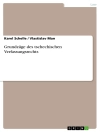This book is based upon a comparative public administration research project, initiated by the Hertie School of Governance (Germany) and the Bertelsmann Foundation (Germany) and supported by a network of researchers from many EU countries. It analyzes both the regimes and the practices of local fiscal regulation in 21 European countries.
The book brings together key findings of this research project. The regulatory discussion is not limited to the prominent issue of ...
Inhoudsopgave
Introduction: The Relevance and Conceptualisation of Local Public Finance Regulatory Regimes.-
PART I. Concepts of Regulation .- Budget Institutions for Subnational...
Over de auteur
René Geissler is Professor of Public Management at the Technical University of Applied Sciences in Wildau, Germany. Until fall 2020 he was working for Bertelsman...












